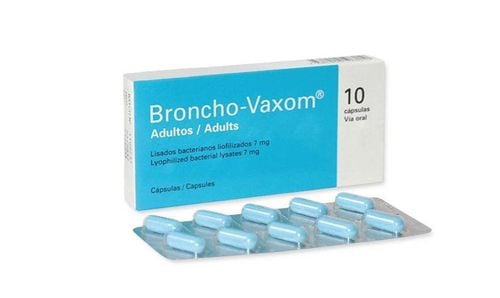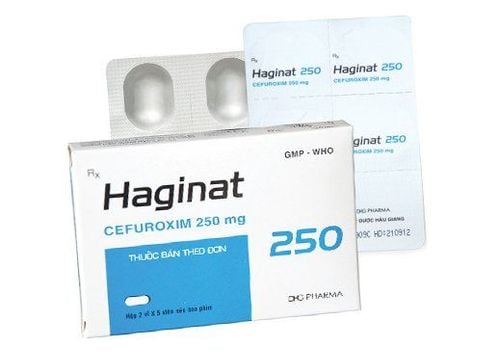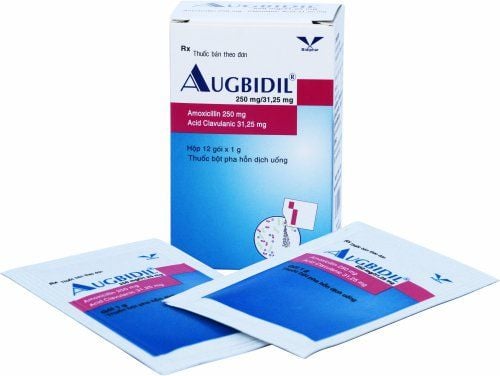This is an automatically translated article.
Cotrimstada drug has the main active ingredients including Sulfamethoxazol 400mg and Trimethoprim 80mg. This is an antibiotic used to treat diseases caused by bacterial, parasitic and fungal infections.
1. What does Cotrimstada do?
Cotrimstada drug is used to treat a wide spectrum of Gram (-), Gram (+) bacterial infections, especially gonococcal infections. The drug is used to treat specific diseases as follows:
Uncomplicated acute urinary tract infections and people with pneumonia caused by Pneumocystis carinii. Infections caused by microorganisms sensitive to the active ingredients Sulfamethoxazole and Trimethoprim Urinary tract infections. Infectious prostatitis. Respiratory tract infections. Acute exacerbation of chronic bronchitis. Acute purulent sinusitis in adults. Gastrointestinal infections such as bacillary dysentery.
2. Usage and dosage of Cotrimstada
2.1. How to use Cotrimstada Drug Cotrimstada is prepared in the form of tablets, suitable for direct oral use. This medicine should be taken with food or drink to minimize the possibility of digestive upset. 3.2. Dosage of the drug Cotrimstada Urinary tract infections: treatment for 10 days, 1-2 tablets of 480mg each time, 2 times a day. Respiratory tract infections: treatment for 10 days, 1-2 tablets of 480mg each time, 2 to 3 times a day. Gastrointestinal infections: bacillus dysentery: treatment for 5 days. Take 1-2 tablets of 480mg each time, 2 times a day. In case of overdose of Cotrimstada, users may experience nausea, vomiting, diarrhea, dementia, confusion, facial swelling, headache, bone marrow depression and a slight increase in serum aminotransferase levels. transaminases).
For cases of overdose or acute toxicity of Cotrimstada, the stomach should be emptied immediately by induction of vomiting or gastric lavage. The treating physician will order blood count monitoring and other appropriate clinical tests (such as serum electrolytes). Hemodialysis can only remove a moderate amount of the drug; Peritoneal dialysis did not increase the elimination efficiency of Cotrimstada. Treatment of drug overdose is mainly supportive treatment combined with symptomatic treatment.
3. Undesirable effects of the drug Cotrimstada
During the use of Cotrimstada, users may experience some unwanted effects, specifically as follows:
Hypersensitivity reactions, such as: Common: fever, skin reactions including: including erythema, pruritus, photosensitivity, exfoliative dermatitis, and erythema. Serious: Potentially fatal, skin reactions including toxic epidermal necrolysis or Stevens-Johnson syndrome. Other: Dermatitis, systemic lupus erythematosus, particularly exacerbation of existing diseases. Increased nephrotoxicity such as interstitial nephritis and tubular necrosis, low back pain, hematuria, oligouria, and dysuria may occur. Blood disorders: Agranulocytosis, aplastic anemia, decreased platelet count, decreased white blood cell count, decreased prothrombin and increased eosinophil count. Liver enzyme disorders, cholestatic jaundice. Rare: Cyanosis caused by methemoglobin, acute hemolytic anemia.
4. Cotrimstada drug interactions
Warfarin: Cotrimstada may prolong the blood clotting time of people taking the anticoagulant Warfarin because it inhibits the clearance of warfarin's metabolite. Phenytoin: Cotrimstada inhibits the metabolism of phenytoin. Methotrexate: Due to the active ingredient Sulfonamide in the composition of the drug Cotrimstada can displace methotrexate in binding to plasma proteins thereby increasing the concentration of free methotrexate. Cyclosporin: A reversible sign of nephrotoxicity in kidney transplant recipients who are taking Cotrimstada with Cyclosporin. Digoxin: Increased serum digoxin levels may occur in people taking Cotrimstada; This interaction is more common in the elderly. Indomethacin: Increased plasma concentrations of Sulfamethoxazole may occur when users are being treated with Indomethacin. Pyrimethamine: Macrocytic anemia has been reported in people taking Cotrimstada and Pyrimethamine in excess of 25 mg/week (for malaria prevention). Antidepressants: Cotrimstada may decrease the effectiveness of tricyclic antidepressants. Amantadine: Delirium toxicity has been reported when Cotrimstada is used in combination with Amantadine.
5. Some notes when using Cotrimstada
5.1. Contraindications of the drug Cotrimstada People with a known hypersensitivity to the active ingredient Sulfamethoxazole or Trimethoprim or any other ingredient of the drug. People with severe liver damage. Patients with severe renal impairment when renal function cannot be controlled or in cases where the clearance is less than 15ml/min. People with megaloblastic anemia due to folate deficiency. Women who are pregnant and breastfeeding. Infants and children under the age of 2 months. 5.2. Note when using the drug Cotrimstada Cotrimstada drug should be used with caution in people with kidney failure, people with the possibility of folate deficiency (such as the elderly, people taking anticonvulsants, malnourished people, alcoholics, etc.) malabsorption syndrome). Use with caution in alcoholics if you have severe allergies or bronchial asthma, or have glucose-6-phosphate dehydrogenase (G-6-PD) deficiency. People who are taking Cotrimstada should pay attention to maintain adequate water intake to avoid crystallization of urine and formation of urinary stones. Regular tests of blood count, urinalysis, and renal function should be performed in patients on long-term treatment with Cotrimstada. The elderly may be highly sensitive to the unwanted effects of this drug. 5.3. Using the drug with special people Using the drug with drivers: Cotrimstada can cause dizziness, drowsiness, tinnitus, insomnia and hallucinations, users should make sure not to be affected before driving or operating machinery. Use in pregnancy: Cotrimstada crosses the placenta and may affect the metabolism of folic acid. You should only use the drug during pregnancy if the treating doctor has weighed the benefits of treatment above the risk of harm to the fetus. Because the active ingredient Sulfonamide in this medicine can cause jaundice in newborns, Cotrimstada is contraindicated in pregnant women. Lactation: Cotrimstada is distributed into breast milk. Because sulfonamides can cause kernicterus in infants under 2 months of age, a decision should be made whether to discontinue nursing or to discontinue Cotrimstada or to use other alternative drugs, considering the importance of using the drug. for the mother. Above is all information about Cotrimstada drug, patients need to carefully read the instructions for use, consult a doctor / pharmacist before using. Absolutely do not arbitrarily buy Cotrimstada to treat the disease at home, because there may be unwanted side effects on health.
Please dial HOTLINE for more information or register for an appointment HERE. Download MyVinmec app to make appointments faster and to manage your bookings easily.













